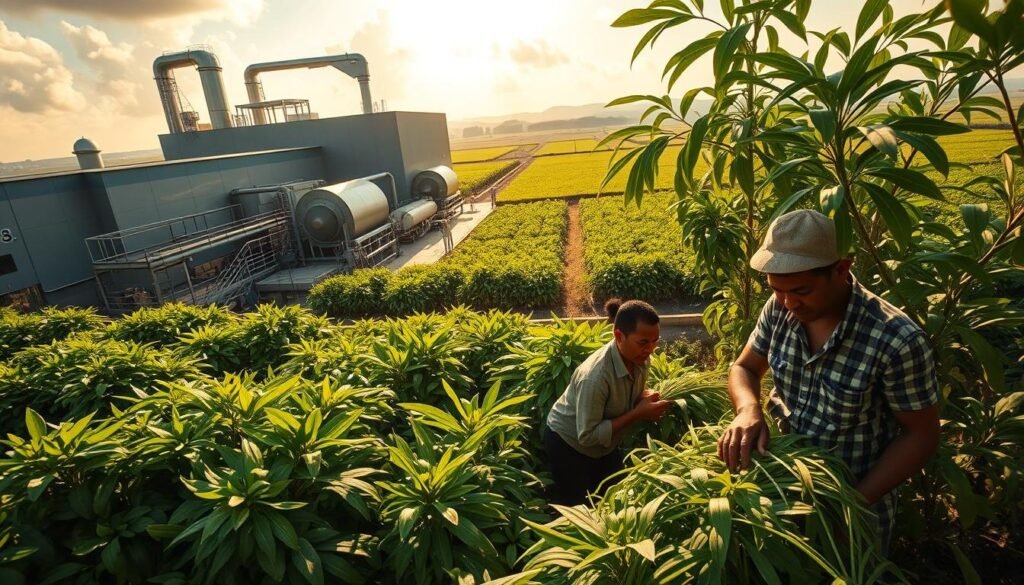You might have heard that moringa, a plant known for its health benefits, is restricted in some places. This has piqued the interest of health lovers and shoppers everywhere.
Looking into why it’s banned, you’ll find it’s more than just the plant. It’s about the rules and views on it. Knowing the moringa benefits and the debate around it sheds light on the world of nutritional supplements and their legal status.
Let’s get into the specifics and find out why moringa is restricted in Europe. And what does this mean for you as someone who buys these products?
Contents
- 1 What is Moringa and Its Rising Popularity
- 2 Understanding the European Regulatory Framework
- 3 Why Is Moringa Banned in Europe? The Official Reasons
- 4 Comparing Moringa Regulations Worldwide
- 5 Implications for Consumers and the Moringa Industry
- 6 Understanding the Moringa Ban in Europe
- 7 FAQ
- 7.1 What is moringa and what are its health benefits?
- 7.2 Why is moringa banned in Europe?
- 7.3 What is the European regulatory framework for dietary supplements like moringa?
- 7.4 How do moringa regulations vary worldwide?
- 7.5 What are the implications of the moringa ban in Europe for consumers?
- 7.6 How does the moringa ban affect the moringa industry?
- 7.7 Are there any alternatives to moringa that are available in Europe?
- 7.8 Can moringa be used as a food ingredient in Europe?
What is Moringa and Its Rising Popularity
Moringa, known as the “miracle tree,” is becoming more popular globally for its health benefits. It’s at the top of the list for natural health supplements.
Moringa oleifera grows in Africa and Asia. It’s been used for centuries in traditional medicine. The leaves, seeds, and pods are used for health benefits like reducing inflammation and supporting heart health.
Moringa is popular because it can help with many health issues. It has anti-inflammatory and antioxidant effects, and it’s good for the heart. But, like any supplement, it can cause moringa side effects, like digestive problems in some people.
Moringa is packed with nutrients. It has vitamins A, C, and E, and minerals like calcium and iron. Here’s a table showing some of its key nutrients:
| Nutrient | Value per 100g | Benefit |
|---|---|---|
| Vitamin A | 756 μg | Supports eye health |
| Vitamin C | 220 mg | Boosts immune system |
| Calcium | 185 mg | Essential for bone health |
As moringa’s health benefits become more known, it’s important to know its good and bad sides. Understanding its nutritional value and uses helps you decide if it’s right for you.
Understanding the European Regulatory Framework
The sale and distribution of dietary supplements, including moringa, are overseen by a comprehensive regulatory framework in Europe. This framework is key to understanding how it affects moringa’s availability in the European market.
The European Food Safety Authority (EFSA) is crucial in checking the safety of dietary supplements. The EFSA looks at the scientific evidence to make sure these products are safe for people to use. The European Union also has rules for labeling, making, and marketing dietary supplements.
Here is a summary of key aspects of the European regulatory framework for dietary supplements:
| Regulatory Aspect | Description | Impact on Dietary Supplements |
|---|---|---|
| EFSA Evaluation | Scientific assessment of supplement safety | Ensures safety and efficacy |
| Labeling Directives | Regulations on product labeling | Provides consumer information and transparency |
| Manufacturing Standards | Good Manufacturing Practice (GMP) guidelines | Ensures quality and consistency |
The regulatory framework in Europe aims to protect consumers and ensure a unified approach across member states. This framework can sometimes lead to stricter rules, affecting the availability of dietary supplements like moringa.
Understanding the European regulatory framework helps grasp the complexities of bringing dietary supplements to market. This knowledge is vital for manufacturers, distributors, and consumers alike.
Why Is Moringa Banned in Europe? The Official Reasons
Moringa, a popular health supplement, is banned in Europe due to strict rules. The European rules aim to keep food supplements safe and effective. But, these rules make it hard for moringa makers and sellers.
The ban on moringa has several reasons. These include scientific, legal, and policy issues. One big worry is the health risks of eating moringa. European regulators are concerned because there’s not enough safety data on it, especially when eaten a lot or for a long time.
Safety and Efficacy Concerns
In Europe, safety and effectiveness are key for any food supplement, like moringa. The European Food Safety Authority (EFSA) checks these products. The EFSA worries about moringa causing allergies, affecting medicines, or making health problems worse.
| Regulatory Aspect | Description | Impact on Moringa |
|---|---|---|
| Safety Data | Lack of comprehensive safety data | Ban due to potential health risks |
| Efficacy Claims | Unsubstantiated health claims | Regulatory scrutiny and potential fines |
| Labeling Requirements | Strict labeling regulations | Compliance issues for manufacturers |
The table above shows the main rules affecting moringa in Europe. It’s clear that there are big challenges for manufacturers to follow these rules.
In short, the ban on moringa in Europe comes from many factors. Knowing these reasons helps us understand the rules for moringa and other supplements.
Comparing Moringa Regulations Worldwide
The moringa industry faces many rules around the world. These rules vary based on local cultures and health standards. They affect how moringa is grown, sold, and eaten globally.
In the United States, moringa is seen as safe and is sold as a dietary supplement. But, other countries have different rules. For example, Europe has stricter rules because moringa is considered a new food.

Let’s look at how moringa is regulated in different places:
| Country | Regulatory Status | Key Requirements |
|---|---|---|
| United States | GRAS, Dietary Supplement | Compliance with FDA guidelines for dietary supplements |
| Europe | Novel Food | Authorization under the Novel Food Regulation (EU) 2015/2283 |
| India | Traditional Medicine | Regulated under the Ayurvedic, Siddha and Unani Drugs Regulations |
| Australia | Listed Complementary Medicine | Compliance with the Australia New Zealand Food Standards Code |
The table shows that moringa rules differ a lot. This shows how culture, health policies, and trade mix together. Knowing these differences is key for moringa businesses and shoppers.
For the moringa industry, these rules mean products must fit each market’s needs. This might mean different labels, packaging, and even recipes to meet local health and safety rules.
Implications for Consumers and the Moringa Industry
The European ban on moringa has big effects on both consumers and makers. People in Europe can’t easily get moringa products anymore. These products are known for their health benefits, like antioxidants and anti-inflammatory effects.
This ban might make you wonder about its impact on you. If you use moringa supplements, you might not be able to buy them anymore. This could change your health and wellness plans. The industry also faces big problems, like losing money and market share.
- Economic impacts on businesses that rely on moringa products
- Limited consumer access to moringa-based health supplements
- Potential long-term effects on the global moringa market
For the moringa industry, dealing with these rules is key. Companies might need to change their products or find new markets. You, as a buyer, might see changes in what’s available and how much it costs.
In summary, the moringa ban in Europe affects both people and the industry a lot. Knowing about these effects can help you make better choices for your health and wellness.
Understanding the Moringa Ban in Europe
You now know why moringa is banned in Europe. The European rules check if food, like moringa, is safe and works well. The ban is because of worries about its side effects and the need for more scientific studies.
Moringa rules vary around the world. Some places see it as a healthy supplement, while others are more careful because of health risks. This affects how moringa is sold and used.
The discussion about moringa is detailed. The rules in Europe will keep changing how we can get moringa. It’s important to keep up with these changes to make good choices for our health.
FAQ
What is moringa and what are its health benefits?
Moringa is a plant from India, packed with vitamins, minerals, and antioxidants. It helps reduce inflammation, improves heart health, and boosts the immune system.
Why is moringa banned in Europe?
Moringa is banned in Europe due to regulatory issues. These issues include its classification as a novel food and concerns over safety and efficacy.
What is the European regulatory framework for dietary supplements like moringa?
The European Food Safety Authority (EFSA) oversees dietary supplements like moringa. They have strict laws and regulations to ensure these products are safe and of high quality.
How do moringa regulations vary worldwide?
Moringa regulations differ worldwide. In the United States, it’s sold as a dietary supplement. But in Europe, it’s banned due to stricter rules.
What are the implications of the moringa ban in Europe for consumers?
The moringa ban in Europe means consumers can’t buy moringa products. This limits their access to its nutritional and health benefits.
How does the moringa ban affect the moringa industry?
The moringa ban in Europe has big economic impacts on the industry. It limits market access and can hurt the livelihoods of those involved in moringa production and trade.
Are there any alternatives to moringa that are available in Europe?
Yes, Europe offers alternatives to moringa. Options include turmeric, ginger, and other herbal supplements that offer similar health benefits.
Can moringa be used as a food ingredient in Europe?
Moringa can be used as a food ingredient in Europe. But, it must follow the relevant regulations. This includes being approved as a novel food or meeting specific traditional food regulations.

Marcellus Stark is an investigative journalist from San Francisco, USA. He writes about global bans, rules, and unusual laws. He shares clear, interesting, and well-researched stories that help readers understand surprising facts worldwide.

